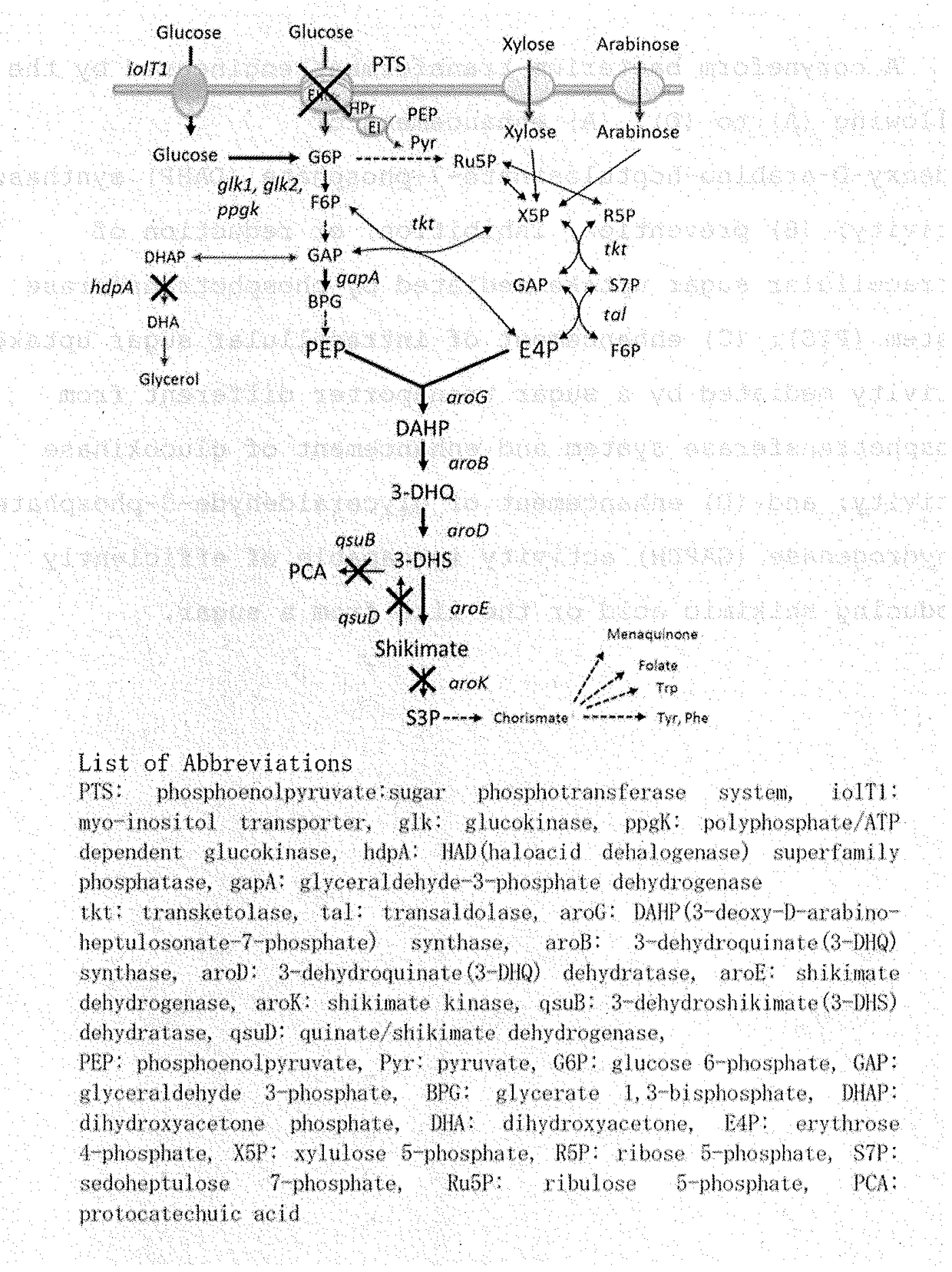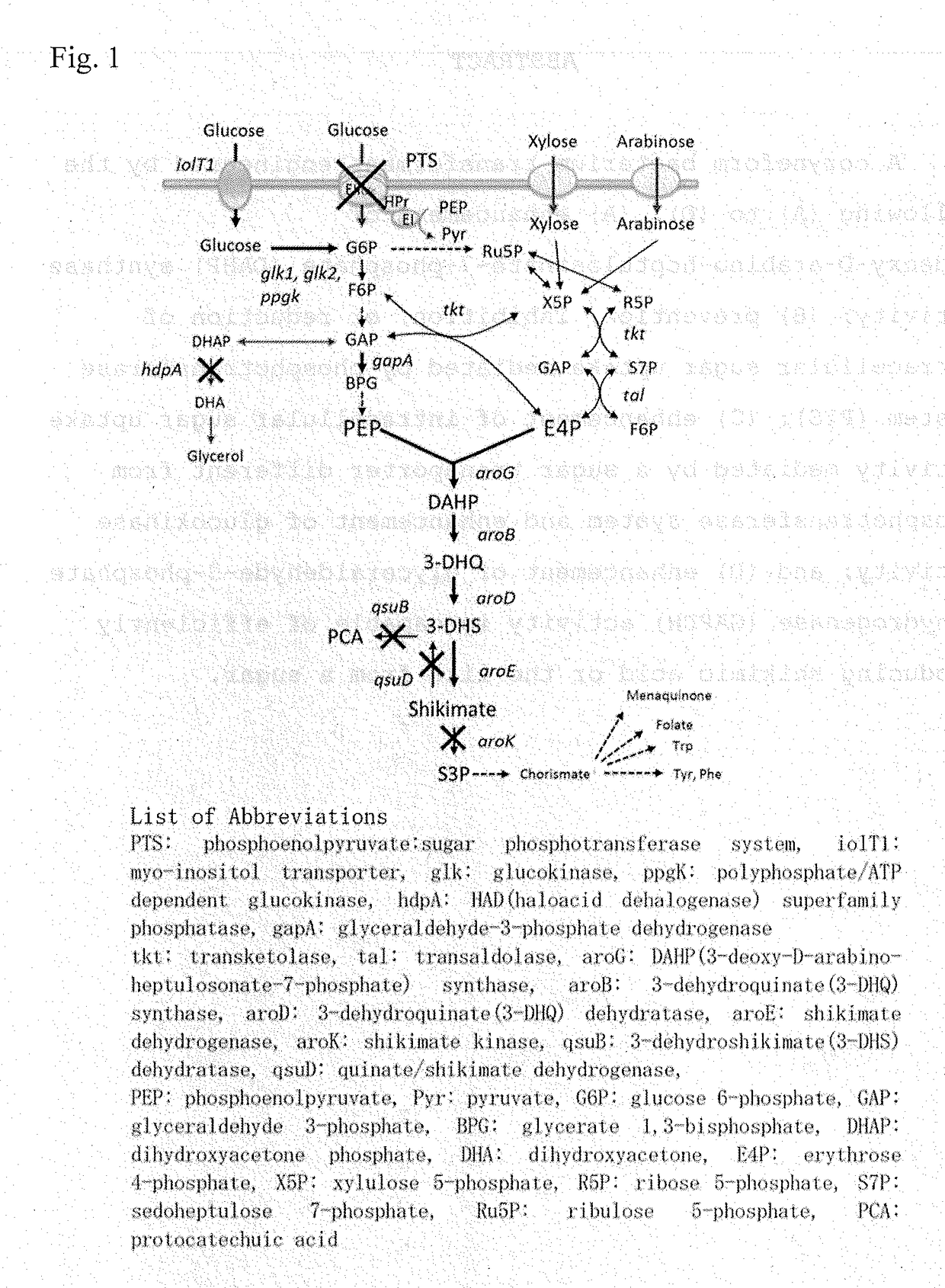Coryneform bacterium transformant and process for producing organic compound using the same
- Summary
- Abstract
- Description
- Claims
- Application Information
AI Technical Summary
Benefits of technology
Problems solved by technology
Method used
Image
Examples
example 1
Construction of Shikimic Acid Producing Strain
[0192](1) Extraction of Chromosomal DNA from Microorganisms
[0193]To extract chromosomal DNA from Corynebacterium glutamicum R (FERM BP-18976), the bacterium was inoculated, using a platinum loop, into A Medium (2 g of (NH2)2CO, 7 g of (NH4)2SO4, 0.5 g of KH2PO4, 0.5 g of K2HPO4, 0.5 g of MgSO4.7H2O, 1 mL of 0.06% (w / v) FeSO4.7H2O+0.042% (w / v) MnSO4.2H2O, 1 mL of 0.02% (w / v) biotin solution, 2 mL of 0.01% (w / v) thiamin solution, 2 g of yeast extract, and 7 g of vitamin assay casamino acid were dissolved in 1 L of distilled water) supplemented with 50% (w / v) glucose as a carbon source to a final concentration of 4%, and cultured with shaking at 33° C. until the logarithmic growth phase. After the bacterial cells were collected, chromosomal DNA was recovered from the collected cells using a DNA extraction kit (trade name: GenomicPrep Cells and Tissue DNA Isolation Kit, made by Amersham) according to the instruction manual.
[0194]To extract c...
example 2
[0582]Shikimic Acid Production by Corynebacterium glutamicum Transformant
[0583]Using a shikimic acid-producing strain SKM6 (see Example 1 (Table 3)) constructed based on the A1X5C1araEΔldhA strain, which is a mixed sugar utilization strain obtained from a shikimic acid-producing transformant of Corynebacterium glutamicum R, a shikimic acid-production experiment was conducted by aerobic fed-batch reaction with use of a jar fermentor (made by Able Corp., Type: BMJ1L) as described below.
[0584]The SKM6 strain was inoculated into 10 mL of A liquid medium (2 g of (NH2)2CO, 7 g of (NH4)2SO4, 0.5 g of KH2PO4, 0.5 g of K2HPO4, 0.5 g of MgSO4.7H2O, 1 mL of 0.06% (w / v) Fe2SO4.7H2O+0.042% (w / v) MnSO4.2H2O, 1 mL of 0.02% (w / v) biotin solution, 2 mL of 0.01% (w / v) thiamin solution, 2 g of yeast extract, 7 g of vitamin assay casamino acid, and 40 g of glucose dissolved in 1 L of distilled water) containing 20 μg / mL each of phenylalanine, tyrosine, and tryptophan, 10 μg / mL of p-aminobenzoic acid, 5...
example 3
[0588]Effect of Dihydroxyacetone Phosphate (DHAP) Phosphatase Gene (hdpA) Disruption on Shikimic Acid Production
[0589]As described in Example 2, in the shikimic acid-producing reaction by the SKM6 strain, remarkable accumulation of dihydroxyacetone (DHA) produced by dephosphorization of dihydroxyacetone phosphate (DHAP), which is a metabolic intermediate in the glycolytic system, was observed. Based on the fact, it was assumed that inhibition of DHA production by blocking the DHA biosynthetic pathway would further increase the efficiency of shikimic acid production. To investigate the effect, a strain SKM7 in which the hdpA gene encoding DHAP phosphatase (HAD (haloacid dehalogenase) superfamily phosphatase) was disrupted in addition to the genetic modifications in SKM6 (see Example 1 (Table 3)) was constructed, and an experiment of shikimic acid production using the strain was conducted under the same conditions and in the same manner as in Example 2. As shown in Table 4, the SKM7 s...
PUM
| Property | Measurement | Unit |
|---|---|---|
| Fraction | aaaaa | aaaaa |
Abstract
Description
Claims
Application Information
 Login to View More
Login to View More - R&D
- Intellectual Property
- Life Sciences
- Materials
- Tech Scout
- Unparalleled Data Quality
- Higher Quality Content
- 60% Fewer Hallucinations
Browse by: Latest US Patents, China's latest patents, Technical Efficacy Thesaurus, Application Domain, Technology Topic, Popular Technical Reports.
© 2025 PatSnap. All rights reserved.Legal|Privacy policy|Modern Slavery Act Transparency Statement|Sitemap|About US| Contact US: help@patsnap.com


